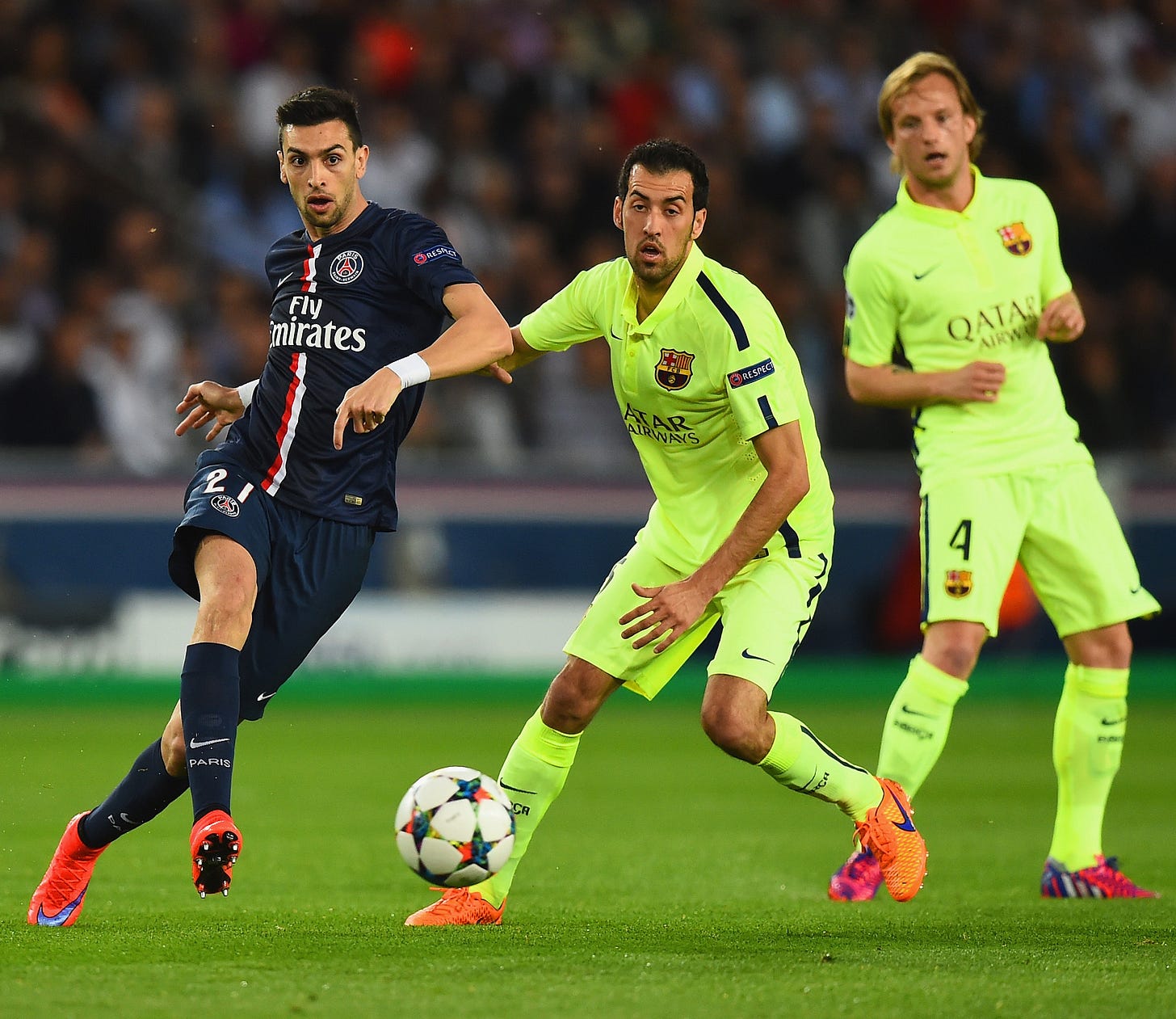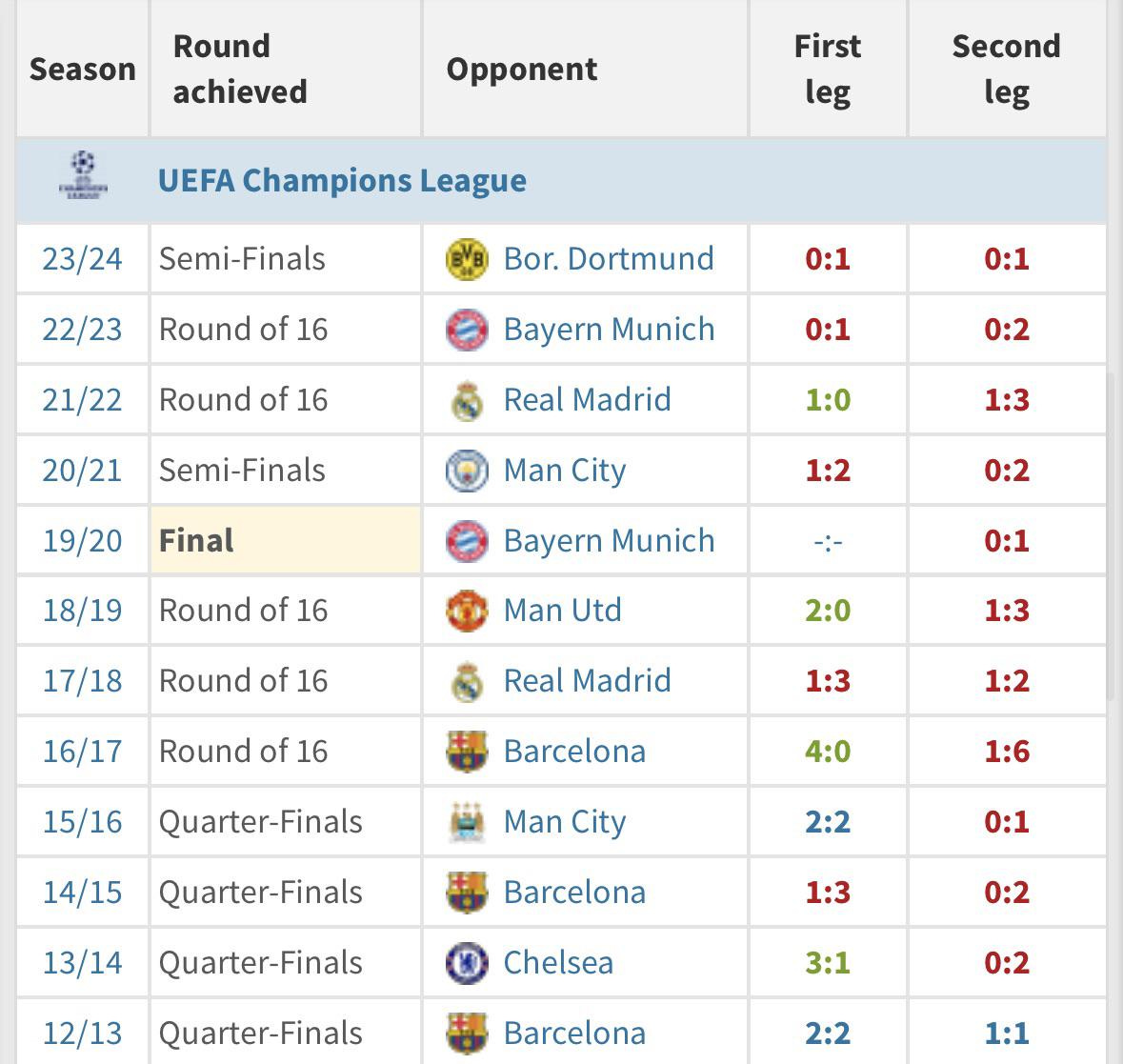PSG Have Been Cursed By the Football Gods
When Qatar Sports Investments took control of Paris Saint-Germain in 2011, the first order of business was to conquer France. Lyon’s dynasty of seven straight Ligue 1 titles had ended in 2008, with Bordeaux and Marseille and Lille stepping into contention. PSG had been asleep since the 1990s, or at least since Jay-Jay Okocha and Ronaldinho departed the capital club in the first few years of the new millennium.
The new ownership group, powered by the incalculable proceeds of digging all those gallons of oil and gas out of the ground beneath Qatar, brought the money cannons out immediately: Thiago Motta arrived from Inter, Alex from Chelsea, Maxwell from Barcelona. Javier Pastore and Blaise Matuidi and Kévin Gameiro and Jérémy Ménez and Mohamed Sissoko and Salvatore Sirigu and Diego Lugano all came in. The first attempt ended in disappointment, but by 2012-2013, PSG were champions of France.

They rattled off three in a row—10 of the last 12—and soon enough, like any rising empire, they set their sights beyond their own borders. Only a European crown would do. The mandate for every manager, and there have been quite a few, has been to win the Champions League. PSG have spent ungodly sums—€2 billion in transfer fees, and perhaps more on wages—and brought in star after star player.
Thiago Silva and Zlatan Ibrahimović arrived from A.C. Milan for that second season, and so did Lucas Moura and Ezequiel Lavezzi and Marco Veratti and Gregory van der Wiel and David Beckham. The year after, it was Edinson Cavani and Marquinhos and Yohan Cabaye and Lucas Digne, and after that it was David Luiz and Angel Di Maria and Julian Draxler and Gonçalo Guedes and many more €30 million transfers nobody even remembers, all leading up to the two titans: Neymar from Barcelona for upwards of €222 million, and Kylian Mbappé from Monaco for €180 million. Who knows what they were paid over the years—or what the paystub looked like for the great one, Lionel Messi, when he came over from Barcelona on a free transfer a few years later.
Some of those aforementioned €30 million punts were ultimately failed transfers. But for the most part, PSG has acquired top players who played well for them. And yet for all that stunning talent, the European crown has eluded them, year after year. Some of the coaches chosen to oversee the project have limited trophy records at the highest level, which could point to a flaw in the design, but others are unimpeachable. Carlo Ancelotti is one of the five best coaches who ever lived, a four-time Champions League winner with two each at two different clubs. Luis Enrique, the current boss, won the treble with Barcelona in 2014-15.
And yet he, like all the others, failed on Tuesday night when PSG were turfed out of the Champions League semifinals by Borussia Dortmund. The Parisians struck the woodwork over and over again, but the ball never went in over the two legs of this tie, as if some force was at work to defend the Dortmund goal when die Schwarzgelben—who defended like lions—ran out of legs and bodies to throw in front of the PSG barrage. It required just a couple of old-fashioned football maneuvers to defeat Gianluigi Donnarumma down the other end: a long ball over the top that Dortmund striker Niclas Füllkrug ran onto, controlled stylishly, and smashed into the net; and a muscular header from center back Mats Hummels at a corner to kill the tie in the second leg.
It was, despite the posts and crossbars, one of PSG’s least spectacular exits from the Champions League. Two years ago, they went to Madrid in possession of a 1-0 first-leg advantage, and Mbappé doubled it as they went 1-0 up at the Santiago Bernabeu. But Karim Benzema conjured up a hat trick across just 17 minutes to send them packing in the Round of 16. A few years before that, in 2019, PSG ground out a 2-0 first-leg victory at Old Trafford despite an injury crisis with Neymar at its center. But somehow, a poor Manchester United side came down to Paris and blasted them 3-1, with Marcus Rashford’s penalty sealing their fate as their Brazilian superstar watched from the sidelines.
But that was all child’s play compared to the disaster of two years earlier, one which may well have played on Parisian minds that night against United. In 2017, PSG battered mighty Barcelona 4-0 in the Round of 16 first leg. They went to the Nou Camp for the second surely believing they’d sealed up a famous victory. The doubts started to creep in when Luis Suárez scored early for the Catalans and mounted when Barcelona got to 3-0. Relief flooded back when a Cavani goal for PSG on 62 minutes seemed to wrap up the tie once again, and yet somehow they contrived to concede three times from the 88th minute, culminating with Sergi Roberto’s winner five minutes into added time that tore PSG’s hearts out.
There was some dubious refereeing in that one, and some decisions that went Real Madrid’s way in 2022 sent PSG President Nasser Al-Khelaifi and Sporting Director Leonardo hunting for the match officials in the bowels of the Santiago Bernabeu. But there’s also something clearly at work here with PSG itself, some force that defies footballing explanations of technical skill or tactical superiority or athletic supremacy. Even beyond all that, there is no way that so many generations of players could all lack the steel and fortitude to handle a Champions League occasion, particularly when some have lifted this trophy elsewhere.
Maybe it’s the mystical power of certain clubs in this competition, the ones with a legacy of winning it. In Real Madrid’s case, it has become a kind of birthright. Those mortal clubs that lack pedigree at the highest level of the European game—Arsenal, Tottenham, and the like—have always run into other teams that carry a transcendent belief that they belong, that they’re here to advance. It becomes a kind of destiny for Barcelona and Bayern Munich and Juventus and—once upon a time—A.C. Milan, something in the water at the training ground, something running through the veins of supporters and crackling through the atmosphere in the stands. At times, it’s surmountable, like with Porto in 2004 or perhaps Dortmund now. But there is a club of clubs at this level, and for the most part, whoever you are, you ain’t in it.
The other New Money Powers of Chelsea and Manchester City endured similar struggles to PSG’s in the beginning, but they eventually got over the hump. Maybe PSG will, too: the consistency with which they’ve made the quarterfinals or more over the last decade should be encouraging. Their Galáctico era is coming to an end now, as Mbappé is on his way to Madrid this summer and the club hierarchy shifts towards recruiting promising young Frenchmen. It could be different next time. But watching all those zipping strikes clang off the woodwork on Tuesday night made me think that something even beyond the power of football heritage was at work. That was a hex from the football gods.⚽︎





